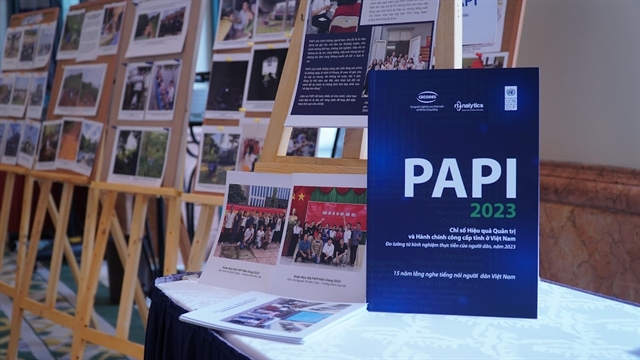 Society
Society

 |
| PAPI 2023 interviewed 19,536 citizens in all 63 provinces and cities in Việt Nam from all demographic backgrounds. Photo UNDP |
HÀ NỘI — Poverty/hunger, employment and economic growth remain the three issues of greatest concern to Vietnamese citizens in 2023, according to the 15th edition of the Provincial Governance and Public Administration Performance Index (PAPI) report released by the UNDP on Tuesday.
Compared to the 2022 report, concerns over jobs and employment in 2023 saw the biggest rise, up 2.7 per cent. This continues a trend evident since 2017 of economic issues figuring as the most prominent cluster of citizen concerns demanding State attention, said the report.
PAPI 2023 has collected the voices of 19,536 citizens - a record number for PAPI over the past 15 years - in all 63 provinces and cities in Việt Nam from all demographic backgrounds on the State of governance and public service provision at the local level.
It was found that economic considerations were a prominent factor driving migration within Việt Nam, with the search for better jobs (21.8 per cent) being the second biggest motivation to migrate in 2023, following reuniting with family (40.68 per cent).
The third most cited reason for migration is deteriorating environmental conditions. This concern was particularly prominent among respondents from the Mekong River Delta, a hotspot of migration, especially to HCM City.
As Việt Nam moves forward in its ambitious energy transition and efforts to mitigate the impacts of climate change on society, it will be vital to pay increasing attention to citizen concerns related to the environment, climate change and access to affordable energy, says the PAPI report.
Anti-corruption efforts
UNDP Resident Representative Ramla Khalidi said “We were encouraged by citizen perceptions that certain types of corruption in the public sector had improved at the local level.
“This is welcome progress, especially considering that, year after year, corruption indicators are those most prominently determining overall citizen satisfaction with local governance.”
According to PAPI 2023, control of corruption in the public sector and e-Governance were the key PAPI dimensions to register progress relative to 2021 and 2022. The improvement in citizen perceptions on control of corruption at the local level rose only modestly, from 6.71 points in 2022 to 6.77 in 2023.
However, transparency in local decision-making, conversely, saw a drop.
Ramla Khalidi said, “While citizens saw progress in some forms of corruption in local administration – and we should celebrate this – other types of corrupt practices are seen to persist. This undermines citizen trust.”
“Diagnosing and addressing the structural weaknesses that create opportunities for corruption is vital for long-term good governance,” she said.
Dr Đặng Hoàng Giang, PAPI research team member, said in terms of corruption control in the public sector at local level, there is an “interesting transition”.
Two to three years ago, southern localities performed better while in the recent years, northern provinces and cities have been listed in the group of high and medium-high grades. Mekong Delta localities seemed to be lagging behind in this dimension, he said.
E-governance access
The PAPI report found that in 2023, access to the internet and access to provincial e-governance portals both rose relative to 2020.
While nearly 80 per cent of PAPI survey respondents in 2023 had internet access at home, the results also highlighted digital divides. Access to the internet varies across gender, living areas, ethnicity and migrant status. A persistent 5-10 per cent gap has favoured men over the years, while ethnic minorities have 10-20 per cent less access than the Kinh majority.
Findings also revealed that citizens were slow to switch to e-governance, with just 8.3 and 7.6 per cent of respondents using the umbrella National E-Service Portal (NESP) or Provincial E-Service Portals (PESP) available in all 63 provinces, respectively. One reason for this is privacy concerns, as stated by one-third of users.
PAPI suggested the need for substantial improvements to make services more accessible, user-friendly, convenient and inclusive for all citizen users. A practical measure is to design a single-device approach to online public service portals, so users can access them from anywhere with smartphones. Addressing citizens’ privacy concerns is also important.
Dr Đặng Hoàng Giang said among eight dimensions measured by PAPI - participation at local levels, transparency, vertical accountability, control of corruption, public administrative procedures, public service delivery, environmental governance and e-government, public service delivery earned the highest points from citizens.
There had also been improvements in the participation at local levels and e-government dimensions, he said, adding that there was much room for PAPI’s improvement in the next years.
Commenting on the PAPI 2023’s results, Deirdre Ní Fhallúin, Irish Ambassador to Việt Nam, said while there had been real progress, there was clearly more work to be done.
“We must not simply put this data on the shelf and move on, we must realise PAPI’s potential. I hope that central and provincial authorities will continue to use this valuable data to drive positive change.”
“36 provinces convened PAPI diagnostic workshops to share survey findings and formulate responses. 62 provinces renewed their commitment to improve performance in response to PAPI findings. 50 provinces issued action plans to request sectors, district and commune governments to improve their performance. I hope that this positive momentum can continue,” she said.
PAPI 2023 has been funded by the Department of Foreign Affairs and Trade (DFAT) of Australia and the Embassy of Ireland. VNS